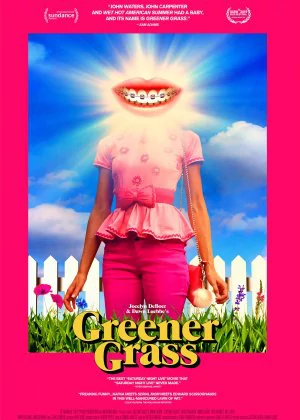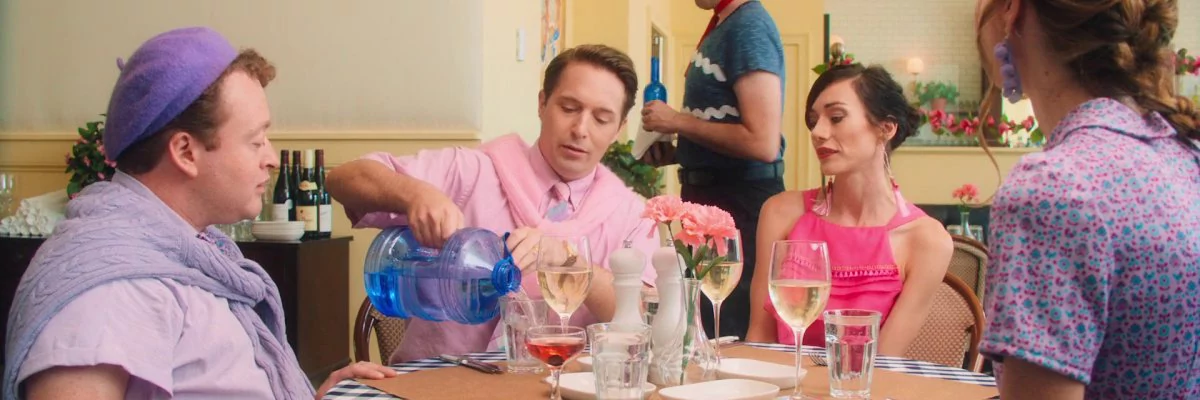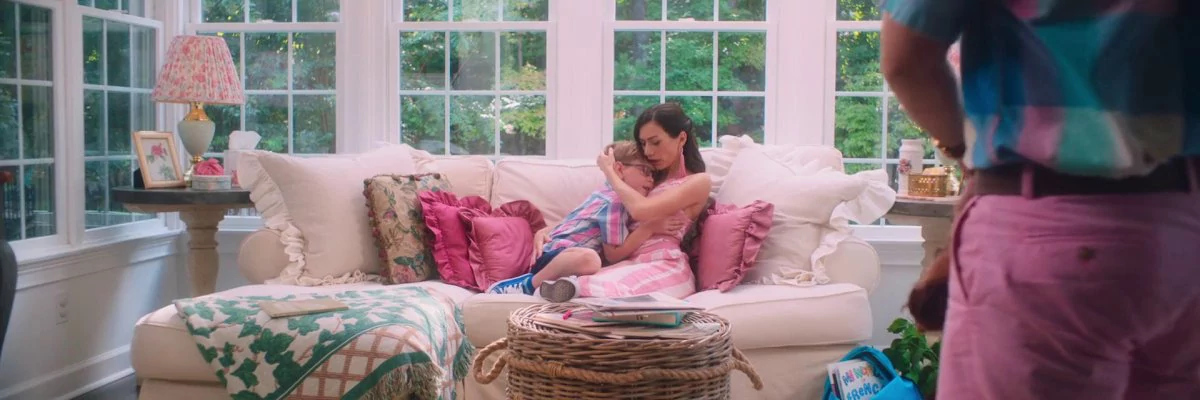Greener Grass

When not enough women are directing films, when men are deemed funnier than women and when straight-up comedies are becoming increasingly rare, you need role models who lead by example. Enter Jocelyn DeBoer and Dawn Luebbe, two extremely talented ladies who wrote, directed and starred in Greener Grass, one of the funniest, loveliest and most bonkers comedies I've seen in quite a while. It's one of those films that is best enjoyed knowing as little about it as possible, but because there's a big chance it might just slip by unnoticed, I see it as my duty to give this film some well-deserved exposure.

For all intents and purposes, Greener Grass is a wildly original film. Some people have drawn comparisons with Lynch, Burton and Wes Anderson, and while understandable (and not entirely unfair), the film as a whole isn't even remotely like anything these guys ever made. There is one other name though, a man who carved out a niche for himself and is finally getting some company. Greener Grass immediately reminded me of Jim Hosking (An Evening with Beverly Luff Linn and The Greasy Strangler). That is not to say it feels like a rip-off or a direct copy, but the parallels are there and since so few other films venture is this awkward, absurd and overstated comedy territory, the comparison simply becomes inevitable.
The setting of Greener Grass is an upper-class suburbia. A little, closed-off corner of the world where everything appears neat, tight and organized. People strive for perfection, the sun is always shining and confrontations are avoided at all cost. But you don't have to peel away too many layers to see this is simply a facade. Conversations are littered with thinly veiled, underhanded remarks, people's faces are cramped from the strain to keep the smiles going and personal setbacks cause ever-widening rifts between friendships. It's no doubt one of the brightest and most joyful renditions of Hell I've ever encountered.
The film follows Jill and Lisa, two neighbors who regularly hang out together. One day, when they're cheering on their sons at a soccer game, Jill gifts Lisa her newborn baby. Lisa accepts the gift and both seem happy with the transaction. But when Jill's son transforms into a dog and Lisa gets pregnant again, Jill starts to feel lonely. She wants her baby back, but Lisa isn't willing to part from her and slowly Jill's life starts to crumble down. She has no real friends to support her, her husband seems happier with the dog than he was with his son and Lisa's family is doing a lot better than hers.

DeBoer & Luebbe didn't have Burton-sized money piles to make their film, but they made excellent use of their limited budget to create a bright, colorful, sugarcoated suburbia that drips with visual saccharine. The color story is perfect, the lighting adds an extra layer of shine, costumes are immaculate and the framing is precise. The finish may just be a little crude, with camera work and editing leaving room for improvement, but for a comedy it looks surprisingly sharp and stylized. Add to that some worthwhile visuals gags and there's really nothing to complain about here.
The soundtrack is solid and fitting, but not used to its full potential. It's a jolly, upbeat score that turns a little darker as the film progresses, but rarely makes an impression of its own. It's mostly there to support the visuals and that it does well. I usually don't mind with comedies, but in this particular case I feel it would've been nice if the music had been a bit more distinctive, driving the comedy rather than simply supporting it. One thing I will say though is that the voice work is spot on and almost a soundtrack by itself, dripping with tension, snide and shallowness.
It's always a risk when a director decides to take up a lead role. There's the obvious danger that a film ends up drowning in navel-gazing and pretentiousness. I've never seen a film where two directors took the plunge, afterwards I felt certain this couldn't have been handled any other way. DeBoer & Luebbe absolutely nailed their parts, finding the comedy in two incredibly high-strung soccer moms who can barely hold it together, without making a total mockery of their characters. The rest of the cast was clearly in on the joke, secondary parts are all solid, with notable performances by Neil Casey and Beck Bennett.

Greener Grass is a full-blown comedy, but not without a darker streak. There are the obvious slasher (and broader horror) references, though they're mostly there for giggles. Jill's slow descent into madness feels more substantial, the moment of her breakdown in particular being quite grim and devastating. It's a tricky balance, but DeBoer & Luebbe manage to insert a bit of drama and depth in the finale, without taking away from the absurd comedy. No doubt one of the most common pitfalls for comedies, so it's really nice to see this executed with such precision and elegance.
Making a comedy in the current climate deserves praise. It's a genre in crisis, cannibalized by other genres and muzzled by the fear of cancel culture. Greener Grass isn't the big turnaround, it's way too niche and particular for that. It's not a film that will appeal to a broad audience, but it proves there's still plenty of life left in the genre. DeBoer & Luebbe made a film that's delightfully unique, genuinely funny, completely perplexing and ultimately satisfying. A comedy that delivers from start to finish. I can only hope it's the beginning of a very fruitful career in film for the two of them.